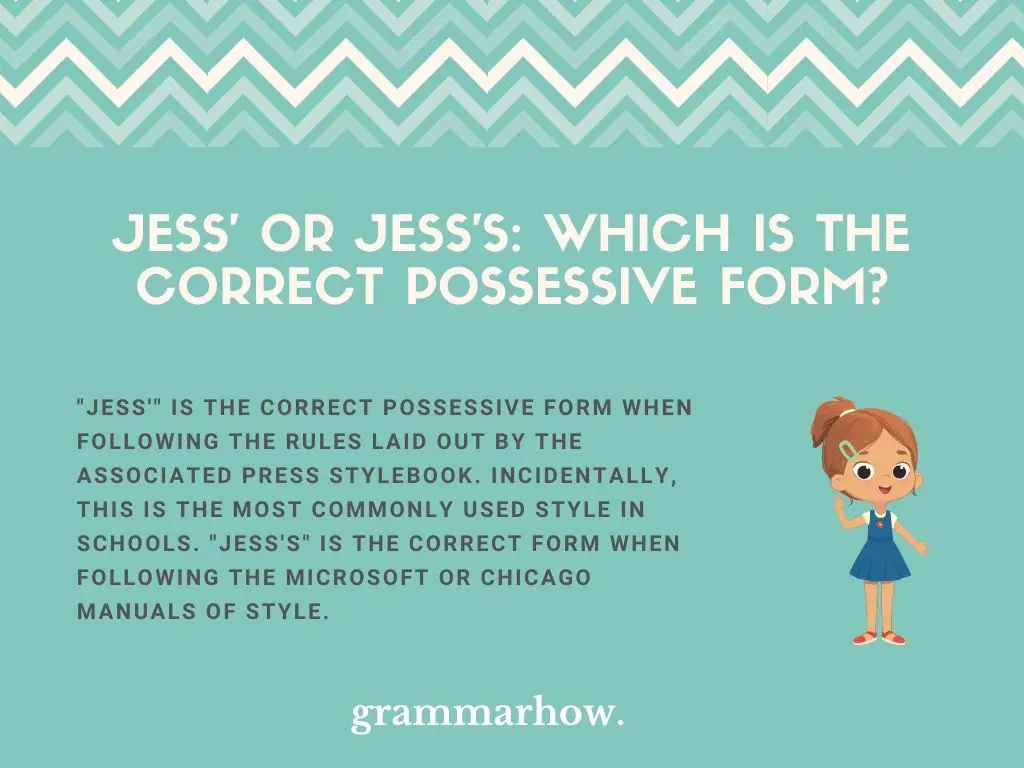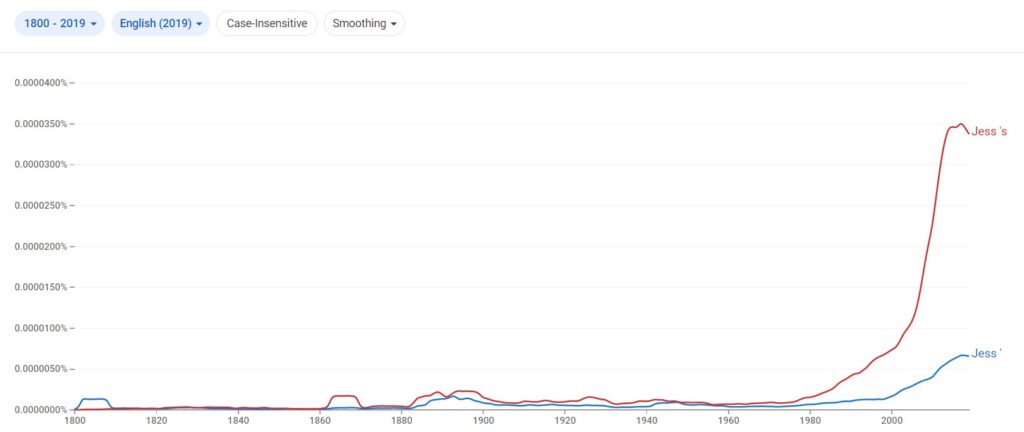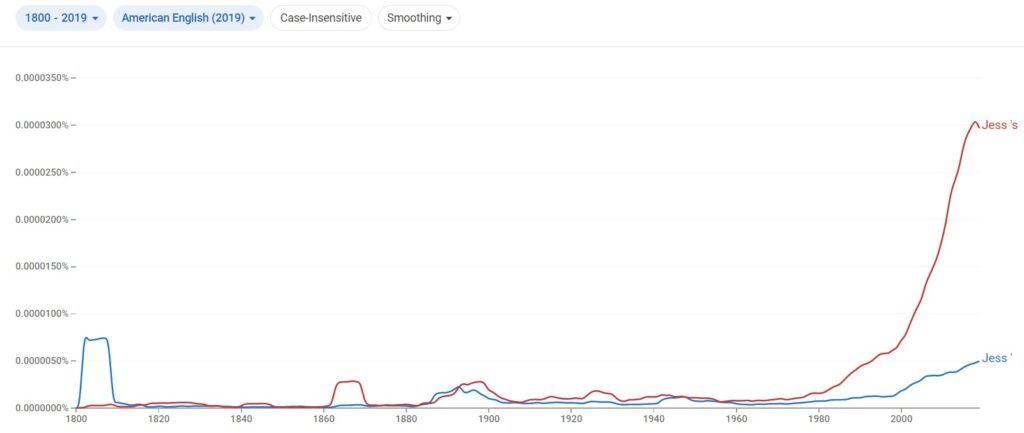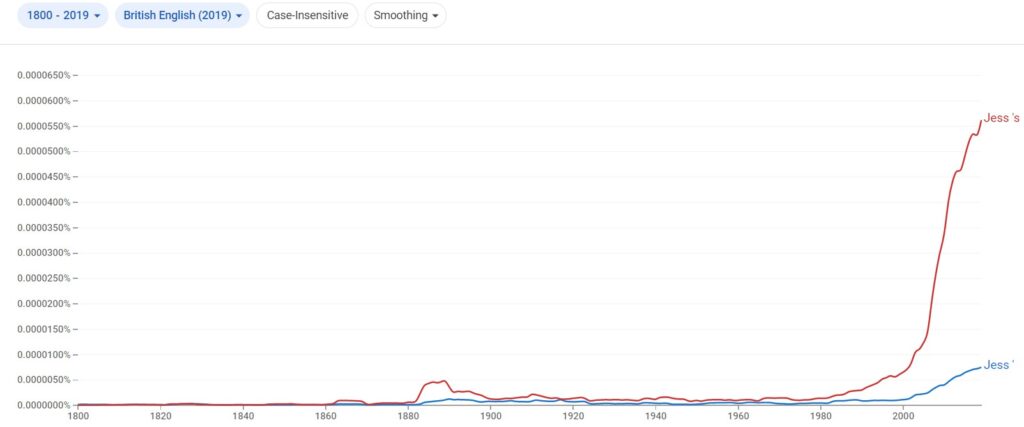When using the possessive form for names ending in “S,” we’re presented with two options. We can either keep the “S” or drop it after the apostrophe. This article will explore what the best version is and how to use it.
Jess’ Or Jess’s: Which Is The Correct Possessive Form?
“Jess'” is the correct possessive form when following the rules laid out by the Associated Press Stylebook. Incidentally, this is the most commonly used style in schools. “Jess’s” is the correct form when following the Microsoft or Chicago Manuals of Style.

Both forms are correct, which is where the choice comes from. Most people decide which style is more appropriate for them, and every writer is different.
However, according to Google Ngram Viewer, “Jess’s” is the most popular choice compared with “Jess’.” Most people lean toward using the “S” ending after the apostrophe to aid readability.

When To Use Jess’
Let’s start with “Jess’.” While it’s the common school choice, it’s not the most common English choice. Why don’t we use it more?
“Jess'” is correct, according to the Associated Press Stylebook. AP Style suggests that all names and proper nouns ending with an “S” do not need the extra “S” letter after the apostrophe when the possessive form is used.
In this style, the extra “S” is considered redundant and doesn’t add value to the sentence. Removing it helps some people to pronounce the names, too, since they don’t have to worry about a double “S” sound in the ending.
- Jess’ scooter
- Jess’s scooter
The above example shows you how easy it is to write “Jess'” in possessive form. The second example shows you how difficult it can be to pronounce with all the extra “S” letters.
Examples of Jess’
- That is Jess’ scooter, and you should give it back.
- Where can we find Jess’ workplace?
- These aren’t Jess’ trainers, are they?
- You must have Jess’ back in an argument.
- Jess’ father is somewhere down here.
“Jess'” is the possessive form of “Jess.” We use it by placing an object directly after the name to show what it is that “Jess” possesses in the sentence.
When To Use Jess’s
The more likely spelling variation includes the “S” after the apostrophe. Two different stylebooks follow this rule, and it would help to learn more about it.
“Jess’s” is correct, according to both the Microsoft Manual of Style and the Chicago Manual of Style. In these styles, names and proper nouns that end with an “S” still require the “S” after the apostrophe in the possessive form.
We keep the “S” after the apostrophe to aid readability. Sometimes, a reader will miss the possessive form if they’re only given an apostrophe to look for. The extra “S” helps people never to mistake the possessive form again.
- Jess’s watermelon
- Jess’ watermelon
As you can see, the double “S” on either side of the apostrophe is an easy way to tell that we’re in the possessive form.
Examples of Jess’s
- I have Jess’s watermelon in the fridge.
- You can’t be Jess’s only friend!
- We are here for Jess’s belongings.
- You are not Jess’s husband.
- Jess’s dream is to become a singer-songwriter, just like you.
“Jess’s” is the possessive form and works like “Jess’.” Only the style is what changes which one we use. An object should come straight after “Jess’s” to show us what she is possessing in the sentence.
Is There A Preference For Using Jess’ Or Jess’s In US vs. UK?
Sometimes, there are clear language preferences between American and British English. Do these same preferences apply to the possessive form?
According to Google Ngram Viewer, “Jess’s” is by far the most popular choice in American English. They stick to the expected rules found throughout this article.

According to Google Ngram Viewer, “Jess’s” is also the most popular choice in British English, though it’s much more apparent here.

American and British English both follow the same rules, making “Jess’s” the best choice in either case.
Final Thoughts
While both forms are correct in the possessive form, we should mostly focus on using “Jess’s.” It’s the more common style that many people expect to see. No matter what style you decide to use, you should always try and stick to it throughout your writing piece.
You may also like: Dennis’ Or Dennis’s? Here’s The Possessive Form (Helpful Examples)

Martin holds a Master’s degree in Finance and International Business. He has six years of experience in professional communication with clients, executives, and colleagues. Furthermore, he has teaching experience from Aarhus University. Martin has been featured as an expert in communication and teaching on Forbes and Shopify. Read more about Martin here.
